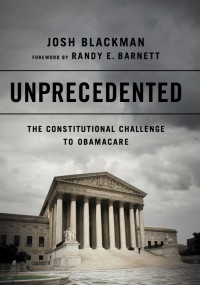Avik Roy comments on the final regulations issued for Obamacare, and points out one of the most practical implications of the rushed manner in which the ACA was enacted–the penalty is too small:
3. The mandate fine is small, and will have even less impact over time
In 2014, the fine for not carrying insurance is the higher of $95 per person or 1.0 percent of taxable income. In 2015, the fine is the higher of $325 per person, or 2.0 percent of taxable income. In 2016, it’s $695 per person or 2.5 percent of taxable income. You’re liable for up to 2 additional dependents, fine-wise.
A number of people have remarked upon the obvious fact that a several-hundred-dollar fine is nothing, compared to spending several thousand dollars on overly costly health insurance. But what a lot of people don’t realize is that, after 2016, the size of the fine is adjusted annually for cost-of-living increases. But historically, the cost of insurance has gone up every year at rates far exceeding normal inflation.
If that trend continues, the gap between the mandate fine and the cost of health insurance will continue to widen, incentivizing more people to go without coverage.
 As it stands now, the mandate is nowhere near high enough to create proper incentives for many who choose to go uninsured to buy insurance. In our current political grudge-match, Congress will not be able to increase the penalty. The political will is simply lacking. The Democrats would never let the Republicans open up the ACA, because other things would be changed.
As it stands now, the mandate is nowhere near high enough to create proper incentives for many who choose to go uninsured to buy insurance. In our current political grudge-match, Congress will not be able to increase the penalty. The political will is simply lacking. The Democrats would never let the Republicans open up the ACA, because other things would be changed.
But, let’s assume Congress had the will to raise the penalty to be high enough to be effective. That raises the important question of when it crosses the line of coercion outlined in the Roberts saving construction. As I discuss in Unprecedented, Congress very well may be prevent from imposing a penalty high enough to work. This is one of the more practical implications of the Roberts saving construction.